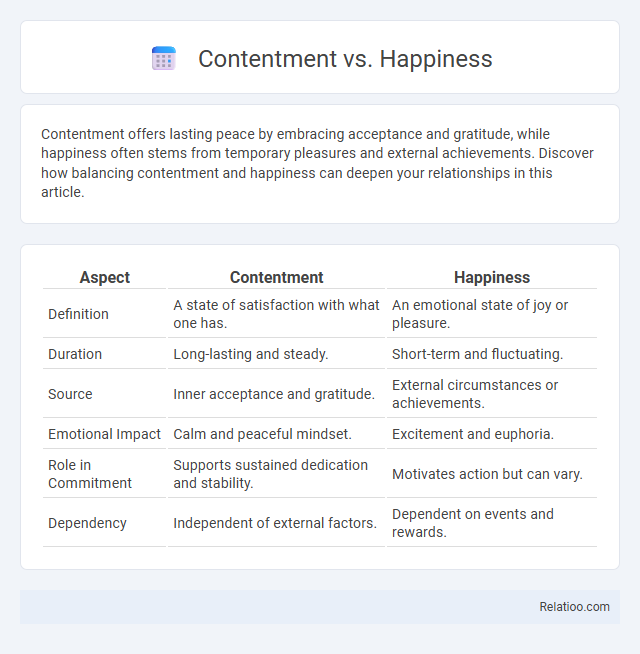Contentment offers lasting peace by embracing acceptance and gratitude, while happiness often stems from temporary pleasures and external achievements. Discover how balancing contentment and happiness can deepen your relationships in this article.
Table of Comparison
| Aspect | Contentment | Happiness |
|---|---|---|
| Definition | A state of satisfaction with what one has. | An emotional state of joy or pleasure. |
| Duration | Long-lasting and steady. | Short-term and fluctuating. |
| Source | Inner acceptance and gratitude. | External circumstances or achievements. |
| Emotional Impact | Calm and peaceful mindset. | Excitement and euphoria. |
| Role in Commitment | Supports sustained dedication and stability. | Motivates action but can vary. |
| Dependency | Independent of external factors. | Dependent on events and rewards. |
Defining Contentment and Happiness
Contentment is a state of inner peace and satisfaction with what you have, reflecting acceptance and gratitude, while happiness is a more dynamic and often temporary emotional response to positive circumstances or achievements. Contentment focuses on long-term well-being and stability, whereas happiness tends to fluctuate based on external events. Your understanding of both concepts can help cultivate a balanced mindset that nurtures lasting fulfillment.
The Philosophical Roots of Each Concept
Contentment, happiness, and satisfaction have distinct philosophical roots that deepen their meanings: contentment stems from Stoicism, emphasizing inner peace and acceptance regardless of external circumstances; happiness aligns with Aristotelian eudaimonia, which focuses on flourishing through virtue and purposeful living; satisfaction relates to hedonism, centered on pleasure and the fulfillment of desires. Your understanding of these nuanced concepts can enhance personal well-being by aligning life goals with their foundational philosophies. Each concept guides how you interpret experiences and pursue long-term fulfillment.
Key Differences: Contentment vs Happiness
Contentment signifies a steady, lasting state of satisfaction with one's current circumstances, while happiness often refers to a transient emotional experience triggered by specific events or achievements. Contentment involves acceptance and a sense of fulfillment, whereas happiness tends to be more intense but fleeting and dependent on external factors. Understanding the key differences between contentment and happiness helps in cultivating a more balanced and resilient emotional well-being.
The Role of Expectations
Contentment arises from accepting present circumstances and aligning expectations with reality, leading to a stable sense of satisfaction. Happiness often depends on fulfilling desires and achieving goals, making it more variable and tied to external conditions. Managing expectations is crucial in balancing contentment and happiness, as unrealistic hopes can undermine both by creating disappointment or perpetual desire.
Contentment: The Power of Acceptance
Contentment centers on the power of acceptance, fostering inner peace by embracing your present situation without constant desire for more. Unlike fleeting happiness, which depends on external circumstances, contentment offers lasting satisfaction through gratitude and mindfulness. Your ability to accept life as it is can transform challenges into opportunities for growth and resilience.
Happiness: The Pursuit of Pleasure and Joy
Happiness centers on the pursuit of pleasure and joy, often driven by external experiences and positive emotions that create a temporary sense of fulfillment. Unlike contentment, which reflects a steady state of satisfaction and acceptance, happiness involves moments of exhilaration and delight that can fluctuate based on circumstances. Understanding happiness as a dynamic emotional response helps optimize well-being through meaningful activities and purposeful engagement.
Emotional Stability vs Temporary Highs
Contentment provides emotional stability by fostering a deep, lasting sense of satisfaction rooted in acceptance and gratitude, whereas happiness often manifests as fleeting moments of joy tied to external events or achievements. Emotional stability derived from contentment supports resilience and balanced mental health, while temporary highs linked to happiness can lead to emotional volatility and dependence on external circumstances. Prioritizing contentment cultivates inner peace and sustained well-being, distinguishing it from the transient nature of happiness and pleasure.
Cultural Perspectives on Contentment and Happiness
Cultural perspectives on contentment and happiness reveal distinct values and expressions across societies, with Eastern cultures often emphasizing contentment as a state of inner peace and balance, while Western cultures prioritize happiness as an individual pursuit of pleasure and achievement. In many Asian traditions, contentment is linked to mindfulness and acceptance, forming a foundation for long-term well-being, whereas Western perspectives associate happiness with positive emotions and life satisfaction influenced by external success and personal freedom. These differing cultural frameworks shape how individuals from diverse backgrounds experience and strive for emotional fulfillment.
Can You Have Both?
Contentment and happiness serve different emotional roles; contentment reflects a deep sense of satisfaction and acceptance of your current situation, while happiness often stems from temporary positive experiences. You can experience both simultaneously when contentment provides a stable foundation, allowing happiness to arise from life's joyful moments without dependence. Balancing these emotions promotes long-term well-being by combining enduring peace with vibrant pleasure.
Choosing Your Path: Cultivating Lasting Well-being
Contentment offers a stable sense of fulfillment, grounded in acceptance of the present moment, while happiness often hinges on external circumstances and fleeting pleasures. Choosing your path to lasting well-being involves prioritizing inner peace through mindful practices and gratitude, which foster deeper satisfaction beyond momentary joy. Embracing contentment cultivates resilience and a sustainable emotional balance essential for enduring mental health.

Infographic: Contentment vs Happiness
 relatioo.com
relatioo.com